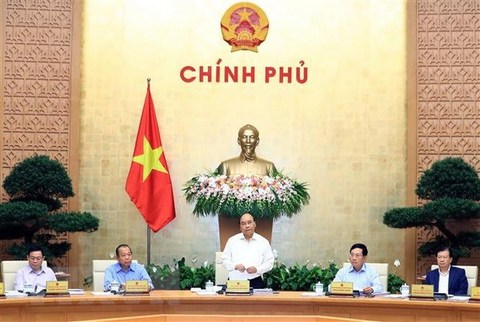
Prime Minister Nguyen Xuan Phuc speaks at the Government’s monthly meeting on Monday. — VNA/VNS Photo
Positive outcomes have been recorded in all economic spheres since the start of the year and the country notched its highest nine-month GDP growth rate since 2011, said Prime Minister Nguyen Xuan Phuc as he chaired the Government’s monthly meeting on Monday.
The PM said GDP grew 6.98 per cent in the period – the fastest nine-month pace since 2011, driven by the processing and manufacturing industry with an expansion of 12.65 per cent.
The Vietnamese Government is aiming to achieve higher economic growth than the 6.7 per cent goal set by the National Assembly, he said.
The macro-economy remained stable while inflation stayed under control as the consumer price index (CPI) rose by 3.57 per cent between January and September.
Export revenue was estimated at US$179 billion, up 15.4 per cent, with exports by domestic firms up 17.5 per cent compared to the 14.6-per cent increase in the FDI sector. Twenty-six products recorded export turnover of over $1 billion, and five of them brought home more than $10 billion.
The country posted $5.39 billion in trade surplus, which was an encouraging record, PM Phuc said.
Total investment in society increased 10.9 per cent, and total retail sales of goods and consumer services revenue rose 11.3 per cent. Meanwhile, more than 96,000 new businesses were set up in the reviewed period.
Viet Nam also took the lead in the Amway Global Entrepreneurship Report 2018. According to the report, 92 per cent of respondents perceived starting a business as desirable and 88 percent said they were ready to take risks, compared to the global average of 47 per cent.
The PM noted that other fields such as culture, society, environment, defence, security and diplomacy also witnessed improvements.
Based on achievements in September and the past nine months, the PM said eight targets for 2018 set by the National Assembly will be surpassed while four others will be reached.
Reviewing the outstanding achievements in September, he highlighted the particular success of the World Economic Forum on ASEAN (WEF ASEAN) – the country’s biggest diplomatic event this year – held in Ha Noi, noting that it was described by foreign delegations as the most successful WEF ASEAN in the last 27 years.
Another noteworthy event was the debut of the Committee for the Management of State Capital in late September. As a special unit subordinate to the Government, it manages State capital at 19 State-owned economic groups and corporations with total capital of VND1 quadrillion ($43 billion) and combined asset value of VND2.3 quadrillion ($99 billion), he added.
Concerning issues
At the meeting, PM Phuc called attention to the US-China trade war, asking ministers and heads of sectors to devise concrete solutions to avoid negative impacts.
The inflation pressure was still strong as a result of both internal and external factors, he said, adding that this problem needs to be further monitored so as to take timely action to keep inflation under control.
He also pointed out certain difficulties facing the export of some farm produce, obstacles to businesses, slow disbursement of construction and investment capital, complicated smuggling and trade fraud, and problems in ensuring social order and safety.
The leader requested Cabinet members work out solutions to existing problems to fulfill this year’s targets and create momentum for 2019.
According to the PM, more than 96,000 enterprises registered for establishment in the first nine months of this year. These enterprises account for only 8 per cent of the total number of firms, while the number of enterprises which stopped operation has increased sharply.
Phuc noted the efficiency of the private sector remains low, calling into question the effectiveness of the work to improve the business and investment climate.
Underlining the significance of completing mechanisms and improving the business climate, PM Phuc asked agencies to accomplish projects to submit to the National Assembly while cutting unnecessary business conditions for investors.
As economic restructuring aims to reduce dependence on foreign capital, the Government leader stressed policies must be employed to develop domestic firms.
Furthermore, he asked the Ministry of Planning and Investment to enhance links between FDI firms and local companies.
The Cabinet leader ordered ministries of education and training and internal affairs to re-organise mobilisation of teachers to ensure schools have enough teachers, especially in remote disadvantaged areas.
He also requested the Ministry of Education and Training submit a report on the printing and circulation of textbooks. — VNS